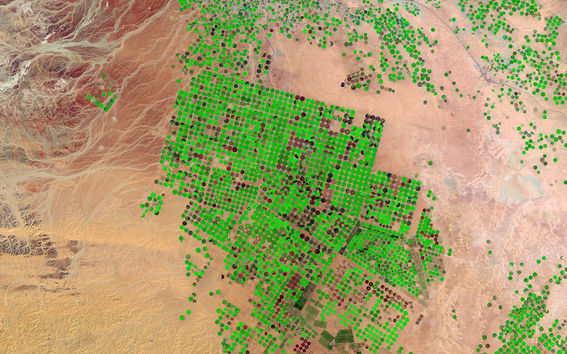Assistant Professor Matti Kummu secures €2 million ERC grant to explore sustainable ways to meet the growing food demand

Human population has more than quadrupled over the past century, but never have we had such high per capita food availability. This has led, however, to high scarcity of key resources to produce food, such as water and land. The rapid population growth and changing climate are projected to intensify the challenge to sustainably meet the growing food demand.
Matti Kummu, Assistant Professor of global water issues, aims to tackle this grand challenge in his new project SOS.aquaterra - Respecting safe operating spaces: opportunities to meet future food demand with sustainable use of water and land resource. The project received two million euros funding from the European Research Council (ERC) through the ERC Consolidator Grant programme. The main aim is to assess globally what are the feasible opportunities to meet the future food demand with sustainable use of natural resources.
The five-year project develops novel integrated modelling and data analysis methods to fully exploit the global open spatio-temporal datasets together with outputs from global agrological and hydrological models.
‘Instead of assessing separately the sustainable use of different natural resources, such as land and water, we integrate them in order to determine feedbacks and potential trade-offs between them,’ says Matti Kummu from the Department of Built Environment.
To evaluate the potential to increase the food supply within the boundaries of sustainable use of natural resources, SOS.aquaterra is developing a global integrated food system model. With this model, it is possible to combine, for the first time, conventional food opportunities – diet change, food loss reduction, yield gap closure and trade – with future innovations like vertical farming and alternative protein sources.
‘The integration of measures using the latest datasets and modelling tools holds naturally high risks. At the same time, our results will significantly advance the understanding of the global food system as well as knowledge on the feasible options to meet the growing food demand sustainably.’
‘I was delighted to hear about the ERC’s decision to support the study of sustainable food production with this Consolidator Grant. Sustainable development is a central element in the strategy of Aalto University and a key part of our activities at the School of Engineering. We look forward to supporting Matti Kummu’s research in any way we can,’ said Dean Gary Marquis.
Contact information
Assistant Professor Matti Kummu
matti.kummu@aalto.fi
Water and Environmental Engineering
Department of Built Environment
Header image: USGS/NASA Landsat Program
Read more news

A sustainable city is also age-friendly
Cities must involve older adults more strongly in the planning of the urban environment.
Renate Zhang’s journey in optimising the cost of creation
During the research program at Aalto University, Renate Zhang developed a cost-saving method that inspired her to pursue a doctoral degree.
Chinonyelum Igwe’s contribution to the frontier of medical AI
Chinonyelum Igwe pursued her dual passions for medicine and AI through the AScI International Summer Research Programme






